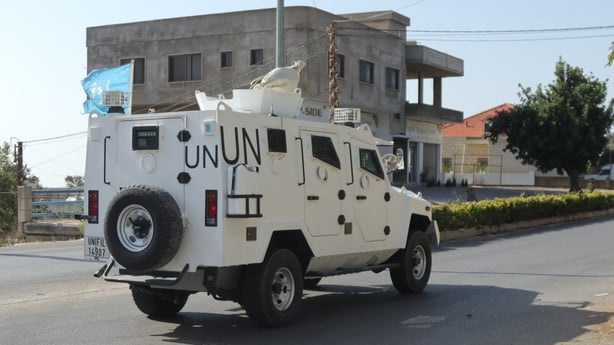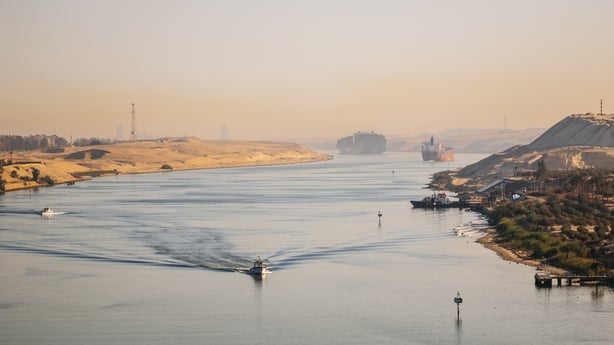Recent weeks have seen unprecedented moves across the European Union to ramp up defence spending as the realisation dawns in member states that the United States may not be the security backstop it once was.
In the face of threats from the east, European nations are busily reassessing their ability to stand up to aggression and to unite against a common foe.
In this context, debate is taking place in Ireland about the future of the Triple Lock - the legislative device that, since 2001, has required a United Nations' mandate along with a Dáil and Government decision to be taken before more than 12 members of the Defence Forces are deployed on overseas missions.
Last year, when he was minister for foreign affairs and defence, Taoiseach Mícheál Martin repeatedly argued that it needed to be changed and Tánaiste Simon Harris, the current minister, is preparing legislation to do just that.
Cabinet approval for the changes has already been given, with Mr Harris saying the focus is very much on ending the veto that permanent members of the UN Security Council have on such missions.
"The Irish people are rightly proud of the role that members of the Defence Forces have played in peacekeeping missions right across the world.
"But under our current Triple Lock system, countries like Russia have the power to veto Ireland’s participation in missions via their role as permanent members of the UN Security Council," the Tánaiste said
"We don’t believe that Putin or other leaders should have a veto on whether our troops can be deployed."

The Government also points out that no new peacekeeping missions have been approved since 2014 and that, since 2001, 56 draft resolutions have been vetoed at the Security Council (not all for peacekeeping missions) - 19 by the US, 16 by China and 37 by the Russian Federation. It all bolsters the case to change the Triple Lock, it says.
But campaigners opposing changes say this is not the whole story. They claim that in the event the UN Security Council does not agree on missions, the UN General Assembly can step in and grant a mandate.
The matter was recently raised by People Before Profit TD Richard Boyd Barrett on RTÉ's The Week in Politics. It was also raised in the Seanad by Independent Frances Black.
"[Simon Harris] claims that under the Triple Lock, each permanent member of the Security Council holds a veto over the deployment of Irish peacekeepers abroad. This is simply not true.
"The Defence (Amendment) Act 2006 specifically defines UN authorisation under the Triple Lock as including resolutions passed by the UN General Assembly. As we all know, there are no permanent members or vetoes in play at the General Assembly.
"The Tánaiste's claims that Ireland's hands are tied by a Russian veto at the Security Council are contradicted by the very text of the legislation that he is seeking to overturn, which is very worrying."
While the Government insists removing the requirement for a UN mandate does nothing to affect Ireland’s neutrality, those opposed believe this country’s role as a peaceful, militarily non-aligned nation will be forever diminished and damaged.
Why change the Triple Lock, they say, when the UN General Assembly can act when the Security Council cannot. So who is right?
The defence acts
Undoubtedly, existing Irish legislation does acknowledge a role for both the UN Security Council and the General Assembly when it comes to the Triple Lock.
The Defence (Amendment) Act 2006 makes reference to "International United Nations Force" as being a force or body "established, mandated, authorised, endorsed, supported, approved or otherwise sanctioned by a resolution of the Security Council or the General Assembly of the United Nations".
The act also provides that members of the Defence Forces shall not be liable to serve outside the State as part of "an International United Nations Force, unless that force is a force or body established by the Security Council or the General Assembly of the United Nations for the performance of duties of a police character".
The UN Charter
The foundational document of the United Nations is the UN Charter. It clearly gives the Security Council primary responsibility for maintenance of international peace and security.
Over the years, this body - not the General Assembly - has authorised dozens of peacekeeping operations and Ireland has been a proud participant in a number of those, the most prominent being the mission in Congo and the ongoing operation in southern Lebanon.
In the document titled 'The United Nations Peacekeeping Operations, Principle and Guidelines' it is clearly stated that "United Nations peacekeeping operations are deployed on the basis of a mandate from the United Nations Security Council".
The role of the Security Council is further explained in the UN guidance document on peacekeeping. It states that "it is for the Security Council to determine when and where a UN peace operation should be deployed".
UN General Assembly
However, this guidance document goes on to explain powers that the UN General Assembly has when it come to such missions. Here it gets interesting. The Assembly is empowered to oversee mission finances and keep all peacekeeping operations under constant review.
Additionally, the document states, the Assembly has power to act itself in the event that Security Council members use their veto.
It quotes the General Assembly's "Uniting for Peace" resolution of November 1950 [resolution 377 (V)], which states that "if the Security Council fails to act, owing to the negative vote of a permanent member, then the General Assembly may act.
"This would happen in the case where there appears to be a threat to the peace, breach of the peace or act of aggression. The General Assembly can consider the matter with a view to making recommendations to members for collective measures to maintain or restore international peace and security."
Crucially, however, the document goes on to point out that this approach was only used once in the history of UN peacekeeping. That was 68 years ago - in 1956 - when Egypt nationalised the Suez Canal.

Whether or not the General Assembly is likely to use it powers in this regard again seems remote, because the Security Council is the long-standing de facto lead on peacekeeping.
It is also the case that Article 12 of the UN Charter states the General Assembly must not make recommendations or take actions on any dispute while it is before the Security Council.
One way or another, the debate here about the future of the Triple Lock will continue with the focus firmly on the role of the Security Council and how the use of the veto on resolutions there ultimately decides if Ireland can take place in peacekeeping operations around the globe.







